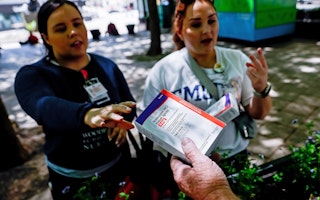Portugal: Drug Decriminalization Works
By Kasia Malinowska
In the 1990s, opinion polls in Portugal revealed that drugs were seen as the nation’s most pressing social problem. Intense debate in the news media, halls of government, churches, and streets of Portugal was inspired by one of Europe’s highest rates of problematic drug use, particularly for heroin. Surprisingly, the Portuguese government’s reaction went against the standard crackdown approach. Instead, the government challenged a committee of specialists—doctors, sociologists, psychologists, lawyers, and social activists—to formulate a new national strategy. In 2000, in a dramatic departure from the international norm, Portugal decriminalized drug possession and use.
Fundamental to the Portuguese approach was the formulation of a new philosophy. Underpinning the changes to drug policy is the recognition that people use drugs for a number of reasons: dependence, personal problems, social factors such as poverty, and pleasure. As a result, the committee concluded that repressive punishment has no rational explanation and is disproportionate. Experts felt that treating drug consumption under criminal law deterred drug-dependent persons from seeking help and further isolated them from society.
Ten years on, HIV rates, problematic drug use, and recidivism have declined. Communities are safer. By moving the matter of drug use and personal possession out of the domain of law enforcement and into that of public health, Portugal proves that decriminalization does not increase drug use. This approach also works for police officers, who are now free to focus on intercepting large-scale trafficking and uncovering international networks of smugglers.
The process behind Portugal’s dramatic changes is documented in a new report published by the Open Society Foundations, Drug Policy in Portugal: The Benefits of Decriminalizing Drug Use. The report, written by award-winning journalist Artur Domos?awski, provides a practical and compelling example of how one country developed and embraced effective, enduring, and humane drug policy reform.
Within the debate on international drug policy, the case study of Portugal provides valuable proof of the effectiveness of rights-based policies.
Portugal is gradually gaining international recognition for its success in decriminalization. A number of policymakers and health experts worldwide (including from India, Thailand, France, and the UK) have visited Portugal to learn from their experience; the Global Commission on Drug Policy showcased Portugal in their recent report; a special issue of The Lancet on HIV in people who use drugs also singled out Portugal’s decriminalization experiment; and the European Monitoring Centre on Drugs and Drug Abuse recently dedicated a report to the Portuguese phenomenon.
Portugal’s refreshing approach to drug policy should serve as inspiration to governments around the world.

Kasia Malinowska is director of Drugs Policy at the Open Society Foundations.


